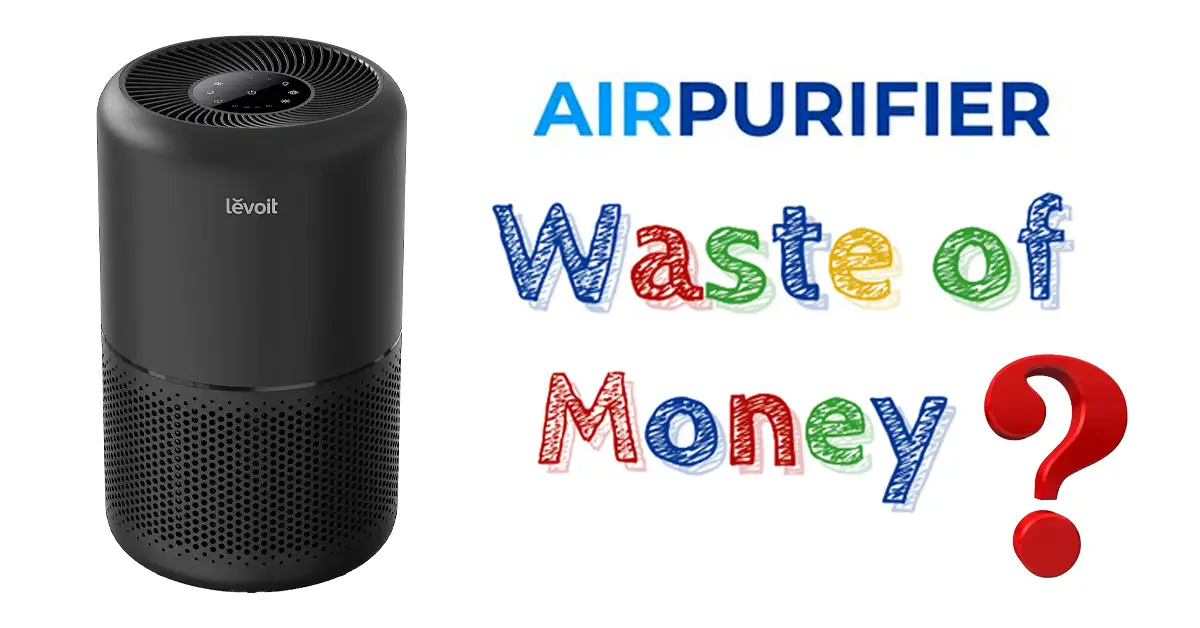Are you wondering whether air purifiers are a waste of money? Let’s delve into their real benefits for our health. Research, including data from the EPA, shows that air purifiers reduce indoor pollution but can’t remove all pollutants. This is crucial for wellness, especially in homes with pets, smokers, or in high-pollution areas. This article explores if air purifiers are just a gimmick or really good for your health and home.
Table of Contents
How Does an Air Purifier Work?
An air purifier improves the air in a room by using filters to clean it. It has a HEPA filter that captures nearly all tiny harmful particles like dust and pollen, being 99.7% effective. It also uses charcoal filters to remove gases and odors. The machine pulls air in, cleans it with these filters, and then sends fresh air back out. However, they don’t remove viruses or gases well. Viruses are often too small, and gases need different methods to clean from the air.
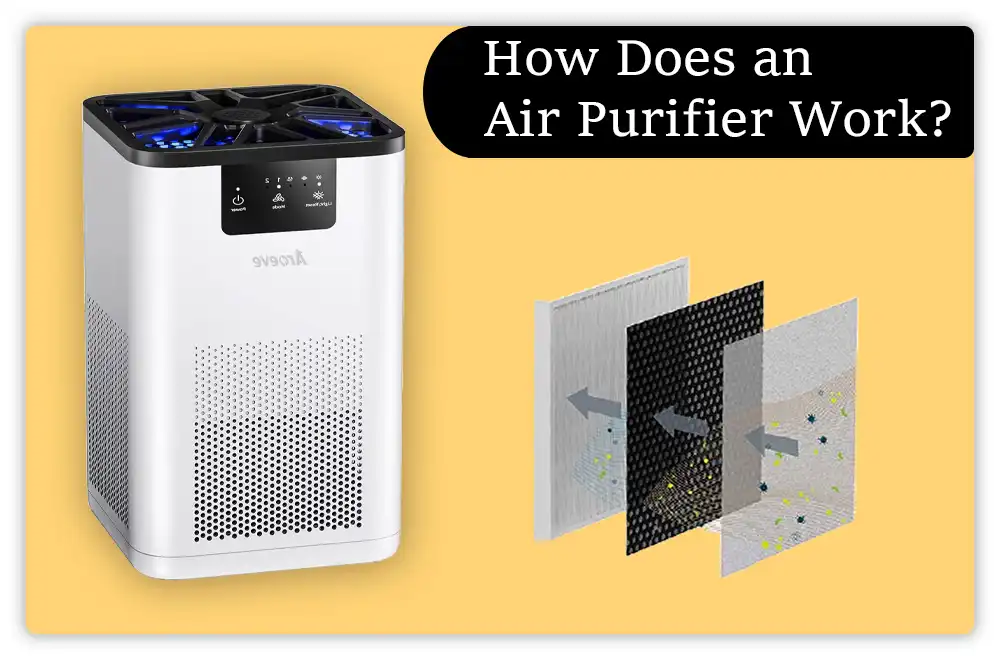
The EPA says air purifiers help but should be used with other methods like good ventilation and source control for best air quality.
Common Pollutants Targeted
Air purifiers work to clear a few main irritants from our air:
- Particulate Matter: This term refers to very tiny particles, such as dust, smoke, and pollen. These particles, when breathed in, can harm our hearts and lungs.
- VOCs (Volatile Organic Compounds): These are harmful gases and odors from common items like spray cleaners and paints. Air purifiers need activated carbon filters to remove VOCs, as not all can catch these gases.
- Allergens: These include things like pet dander and mold that can cause allergies. HEPA filters in air purifiers are great for trapping these particles. Remember, allergens include more than just those, like dust mite debris and some fungal spores.
Benefits of Air Purifiers
Are air purifiers worth it? Think about their role in making air cleaner and how this helps health, especially in homes with lots of pollution or allergens.
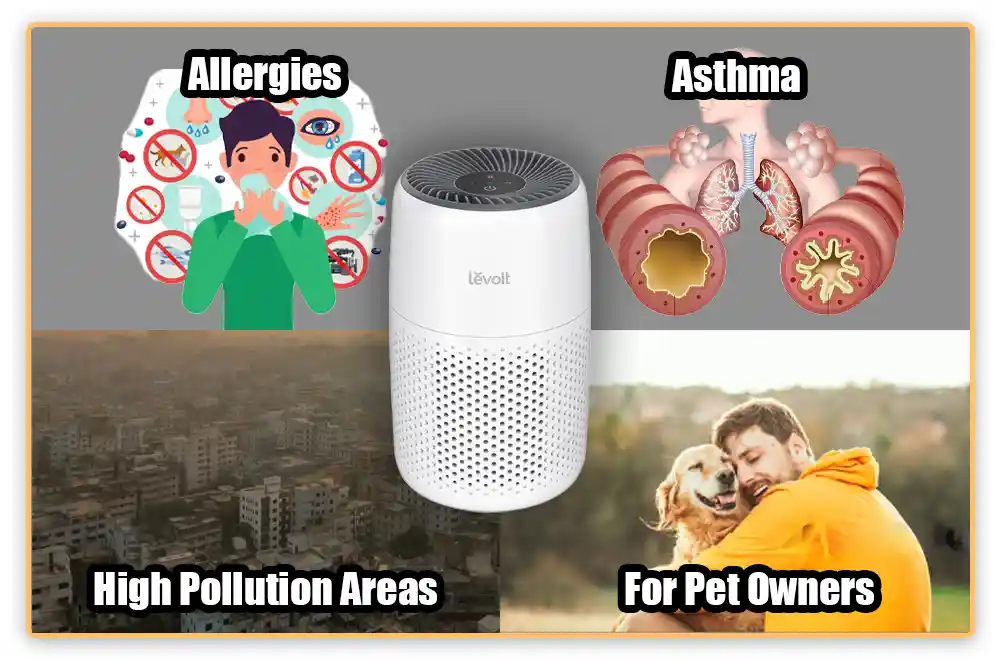
Preventing Allergies
About 30% of adults and 40% of kids in the U.S. have allergies. Every year, over 50 million people deal with this issue, making it the sixth most common chronic illness in the country. These allergies cost U.S. healthcare and businesses around $18 billion each year. Source: WebMD.
Air purifiers with HEPA H13 filters are great for stopping allergies. They pull in air and trap tiny bits like pollen, dust, and pet hair. These filters catch about 99.97% of tiny 0.3 micron-sized particles.This makes the air cleaner and helps people with allergies feel better.
A study in the Yonsei Medical Journal looked at how air purifiers with HEPA filters help adults with allergic rhinitis. They found that using the purifiers for six weeks really helped reduce the need for allergy medicines and dust in homes.
“I used to sneeze a lot because of my allergies. I have pets and tried many things, but only got a little better. Then I bought a big air purifier for my home. It helped a lot! My allergies are not gone, but I feel much better now. From really bad to okay!” — u/ThiccBacon
Reduces Odors
Common smells like cooking, pet odors, or musty rooms can make your home less welcoming. Air purifiers use activated carbon or charcoal filters to remove odors and gases from the air. These filters are great at getting rid of common household smells like those from pets, cooking, and smoke. Breathing clean air cuts down on allergens and irritants that can lead to breathing problems, headaches, and allergies. It also reduces harmful chemicals like VOCs in your home, making your space safer and more comfy.
Improves Sleep
If cigarette smoke or cleaner fumes at night disturb your sleep, a calm bedroom with soft pillows won’t help. These airborne pollutants can disrupt your rest
At night, when you’re trying to relax, you might start noticing the day’s buildup of cooking smells and cleaning chemicals. Sleeping in a room with these pollutants for over six hours can make it tough for your body to refresh itself, affecting your health and sleep.
An air purifier with a HEPA filter can clear the room of smoke and chemical fumes, improving your sleep. Research shows that HEPA filters increase total sleep time by about 12 minutes per night and enhance air quality.
Can Increase Life Expectancy
According to a University of Chicago report, air pollution reduces global life expectancy by 2.3 years. Another study shows indoor air pollution cut life expectancy by 0.7 years in 2019.
Air purifiers help us live longer by cleaning our air. They take out bad stuff like smoke, dust, and fumes. This means less breathing trouble and other health issues from dirty air. Clean air can make you healthier and help you live a longer life.
What to look for when buying Air Purifier
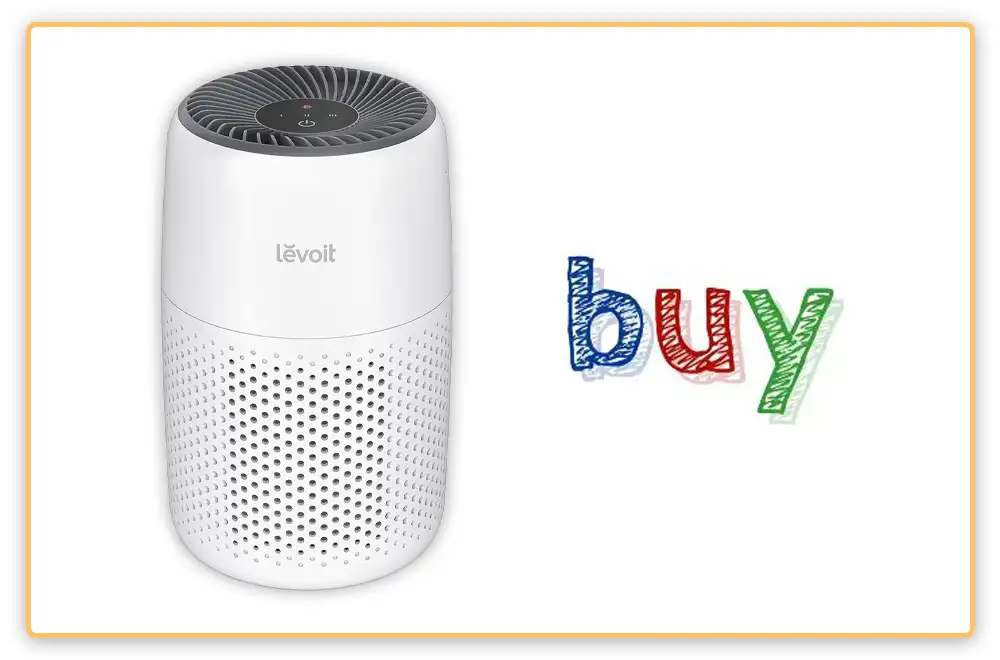
There are some essential factors that need to be considered when buying an air purifier. They are:
CADR Rating: CADR – Clean Air Delivery Rate , It’s very important because it shows how quickly an air purifier can remove dust, smoke, and pollen from the air. A higher CADR rating means the purifier is better for larger rooms, as it can clean more air faster.
Filter Types: Air purifiers have different filters for different jobs. HEPA filters are super at catching tiny things you can’t see, and activated carbon filters are champs at soaking up smells and gases. It’s like having a special cleaning tool for every kind of mess in your house.
Size: Make sure the air purifier fits the room. A small one won’t do much in a big space, similar to how a small fan can’t cool a large room well.
Noise Level: Since you’ll likely use it in places where you relax or sleep, think about how loud it is. Some are so quiet you hardly know they’re there, while others can be pretty noisy.
Disadvantage of Air Purifier
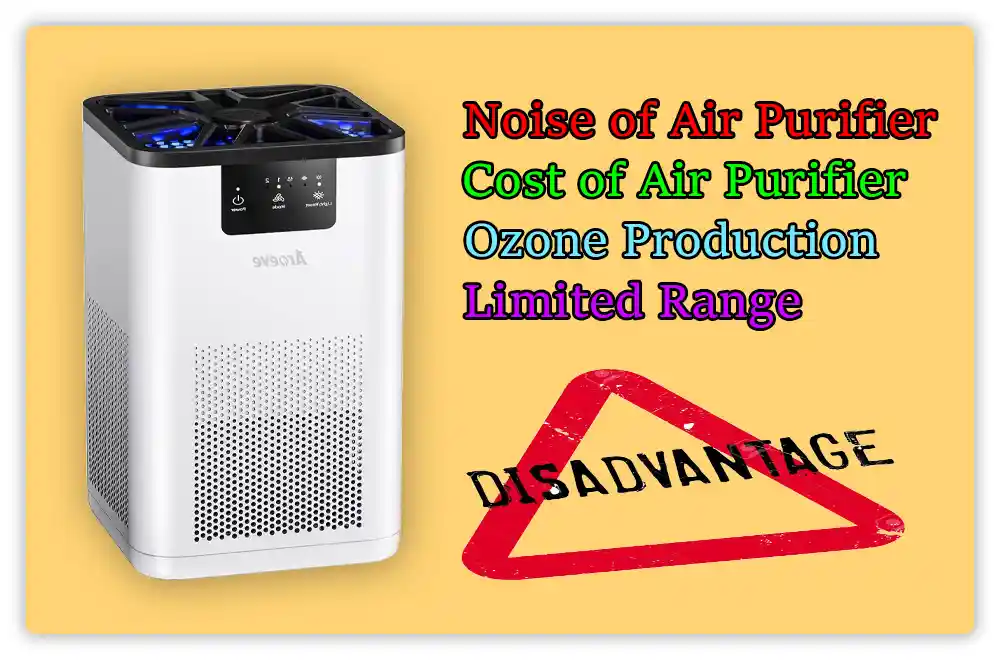
Air purifiers have many benefits but also some downsides. Here are the main cons:
Cost of Air Purifier
Air purifiers can be costly. Basic ones start at around $100, and high-end models can cost over $800. Yearly, replacing filters might add $20 to $100 to your expenses. This makes them a bigger investment over time.
Noise of Air Purifier
Air purifiers make some noise. The quietest ones sound like a whisper and the louder ones like a busy office. This noise can be around 30 to 70 decibels.
Ozone Production
Some air purifiers release ozone, which can irritate your lungs and is harmful to your health. This happens especially with ionizers and ozone generators.
Limited Range
Air purifiers usually only work well in one room. They can clean spaces from 100 to 1,500 square feet, depending on their design. For a whole house, you might need more than one.
When is an Air Purifier a Waste of Money?
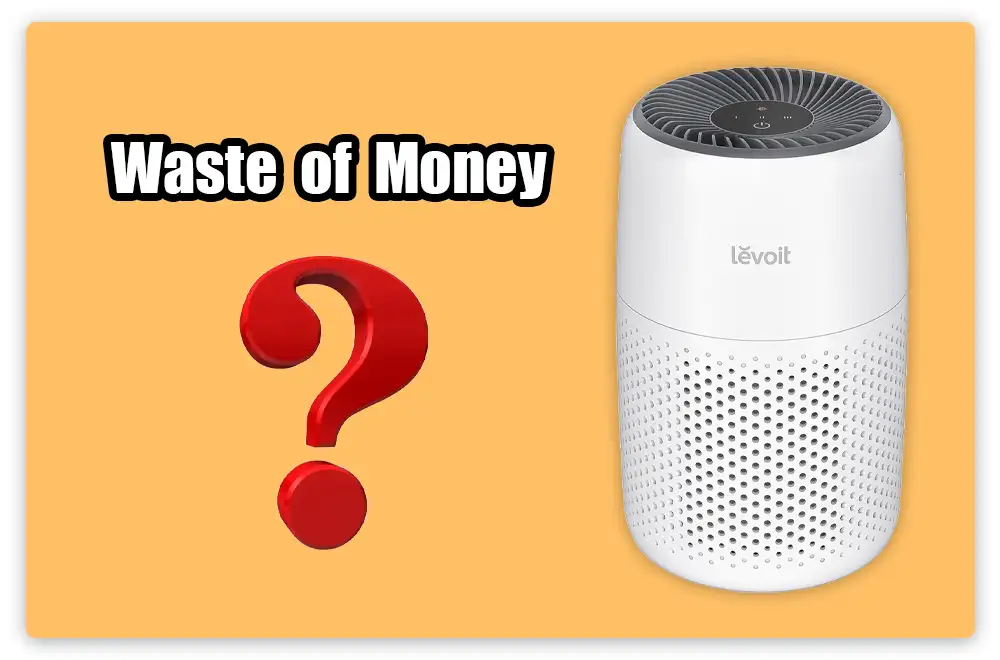
When considering ways to improve our homes and make the air cleaner, air purifiers often come up. It’s helpful to know when an air purifier might not be useful or even necessary. An air purifier might be considered a waste of money in a few situations:
Well-Ventilated and Low Pollution Areas: If the air around you is pretty clean and your home gets plenty of fresh air, an air purifier might not make a big difference. Fresh air from outside can naturally make indoor air better by pushing out bad air.
Misjudging the Purifier’s Capacity: Buying an air purifier that’s too small won’t clean your air well. And if it’s too big, it could use up more electricity without doing much more for you.
Overestimating Capabilities: Expecting an air purifier to remove all odors and particles may disappoint you. These devices are made to reduce, not completely clear, pollutants.
Related Post : Canopy Humidifier Review
The Impact of Air Pollution on Health
Air pollution is a big problem both outside and inside our homes. It can cause serious illnesses like stroke, heart disease, lung cancer, and infections in our lungs.
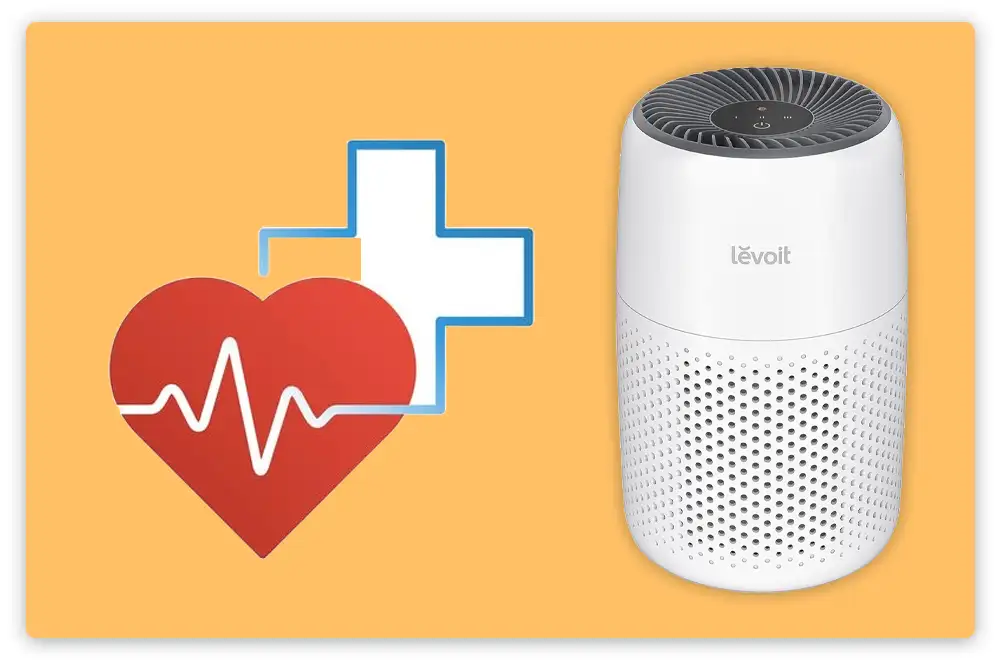
Guidelines from Health and Environmental Organizations
Here are some tips from health and environmental groups on how to keep the air in our homes clean:
World Health Organization (WHO):The WHO advises reducing contact with indoor air pollutants to keep our air clean. They recommend using air purifiers, ensuring homes are well-ventilated, and minimizing sources of pollution.
Environmental Protection Agency (EPA): EPA has a helpful guide called “Guide to Air Cleaners in the Home.” It gives tips on how to pick and use air purifiers the right way. The guide says air purifiers should be part of a bigger plan to make indoor air cleaner.
Asthma and Allergy Foundation of America (AAFA): The AAFA suggests using HEPA filter air purifiers to reduce allergens for those with asthma and allergies at home.
Conclusion
In conclusion, are air purifiers a waste of money? It depends on your needs. For those with allergies or in polluted places, air purifiers are worthwhile, not just a gimmick.
Want more details on whether air purifiers are a waste of money? Leave a comment below or email us at info@homelysolve.com.
FAQ
Should I use Air Purifier Everyday?
Yes, you should use an air purifier every day to keep your indoor air clean. It helps remove dust, pollen, and other pollutants, making it really good for people with allergies or breathing issues.
Do air purifiers remove smells?
Yes, air purifiers can take away smells. They use filters like activated carbon which grab odors from the air. This makes the air in your home smell clean. It’s great for removing common smells like those from cooking, pets, or smoke.
Do air purifiers waste a lot of energy?
No, air purifiers do not waste a lot of energy. They use about as much power as a light bulb. This means they don’t cost much to run daily, helping to keep the air clean without big energy bills.

